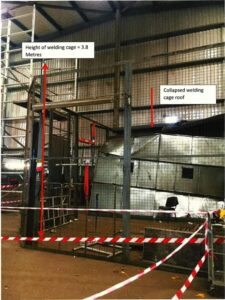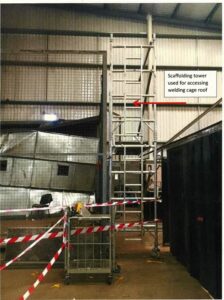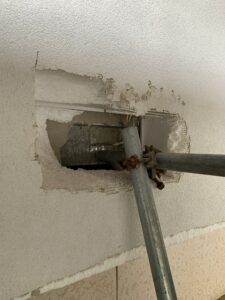Manufacturer fined after workers fall from height
A manufacturer of shopping trolleys has been fined after two men fell approximately three metres when a metal cage they were dismantling collapsed beneath them.
On 12th May 2018, two employees at Wanzl Limited were taking apart a large metal cage as part of an ongoing programme of improvement works at Prologis Park in Coventry.
Following a visual inspection, a decision was made by Wanzl Ltd to hire scaffold towers and scaffolding boards to carry out the work. Once the scaffold towers had been erected the two employees accessed the roof of the cage. They began to remove panels one at a time dropping them to the floor inside the walls of the cage. When several of these panels had been removed the employees noticed that the cage shook in response to movement. The roof suddenly gave way and both employees fell to the floor below.

One of the men, Michael Barton, who was 52 at the time, suffered a broken pelvis, injured his hip and arm. The now 57-year-old, from Walsall, was off work for 12 months following the incident.
An investigation by the Health and Safety Executive (HSE) found that the work had not been properly planned, appropriately supervised, or carried out in a manner that was safe. No consideration was given to whether dismantling the structure could be carried out without working at height or if the work was within the capabilities of the company’s employees. None of the employees involved were trained in the assembly of scaffolding towers, and the injured man was not trained in working at height. An investigation by Coventry City Council came to the same conclusion before primacy was handed to HSE.

HSE has guidance on working at height.
At Birmingham Magistrates’ Court on 10 November 2023, Wanzl Limited of Heathcote Lane, Warwick pleaded guilty to breaching Regulation 4 (1) of the Work at Height Regulations 2005. The company was fined £320,000 and ordered to pay costs of £4016.35.
Speaking after the hearing, HSE inspector Charlotte Cunniffe said: “Working at height remains one of the leading causes of death and serious injury to workers in the United Kingdom.
“All work at height, including one-off activities which fall outside of a company’s usual business should be properly planned and appropriate work equipment selected. Employers must assess the competency of their employees when asking them to carry out non-routine work.”
This prosecution was supported by HSE lawyer Nathan Cook.
Notes to editors:
- The Health and Safety Executive (HSE) is Britain’s national regulator for workplace health and safety. We prevent work-related death, injury and ill health through regulatory actions that range from influencing behaviours across whole industry sectors through to targeted interventions on individual businesses. These activities are supported by globally recognised scientific expertise.
- More information about the legislation referred to in this case is available.
- Further details on the latest HSE news releases is available.


